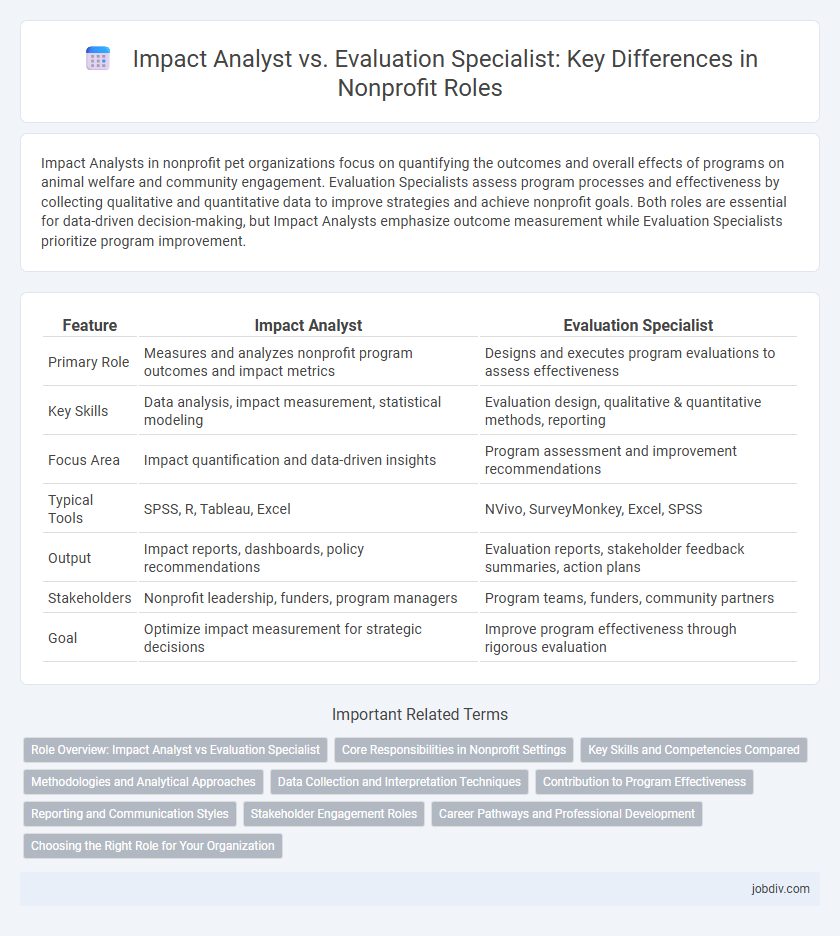Impact Analysts in nonprofit pet organizations focus on quantifying the outcomes and overall effects of programs on animal welfare and community engagement. Evaluation Specialists assess program processes and effectiveness by collecting qualitative and quantitative data to improve strategies and achieve nonprofit goals. Both roles are essential for data-driven decision-making, but Impact Analysts emphasize outcome measurement while Evaluation Specialists prioritize program improvement.
Table of Comparison
| Feature | Impact Analyst | Evaluation Specialist |
|---|---|---|
| Primary Role | Measures and analyzes nonprofit program outcomes and impact metrics | Designs and executes program evaluations to assess effectiveness |
| Key Skills | Data analysis, impact measurement, statistical modeling | Evaluation design, qualitative & quantitative methods, reporting |
| Focus Area | Impact quantification and data-driven insights | Program assessment and improvement recommendations |
| Typical Tools | SPSS, R, Tableau, Excel | NVivo, SurveyMonkey, Excel, SPSS |
| Output | Impact reports, dashboards, policy recommendations | Evaluation reports, stakeholder feedback summaries, action plans |
| Stakeholders | Nonprofit leadership, funders, program managers | Program teams, funders, community partners |
| Goal | Optimize impact measurement for strategic decisions | Improve program effectiveness through rigorous evaluation |
Role Overview: Impact Analyst vs Evaluation Specialist
Impact Analysts specialize in measuring and interpreting data related to a nonprofit's social outcomes, emphasizing quantitative methods to assess program effectiveness and inform strategic decisions. Evaluation Specialists focus on designing and implementing evaluation frameworks, combining qualitative and quantitative approaches to provide comprehensive insights into program performance and stakeholder engagement. Both roles drive evidence-based improvements but differ in their emphasis on data analysis versus evaluation design and stakeholder communication.
Core Responsibilities in Nonprofit Settings
Impact Analysts in nonprofit settings focus on collecting and analyzing quantitative data to measure program outcomes and effectiveness. Evaluation Specialists design and implement comprehensive evaluation frameworks, utilizing both qualitative and quantitative methods to assess program impact and inform strategic decisions. Both roles collaborate closely with stakeholders to ensure data-driven approaches enhance nonprofit mission delivery and resource allocation.
Key Skills and Competencies Compared
Impact Analysts excel in data analysis, statistical methods, and performance metrics to assess nonprofit program outcomes quantitatively. Evaluation Specialists specialize in qualitative research techniques, stakeholder engagement, and designing evaluation frameworks that capture both process and impact dimensions. Both roles require strong communication skills, but Impact Analysts emphasize data visualization and reporting, while Evaluation Specialists prioritize methodological rigor and adaptive evaluation strategies.
Methodologies and Analytical Approaches
Impact Analysts primarily utilize quantitative methodologies such as statistical analysis, data modeling, and performance metrics to measure program outcomes and assess social impact. Evaluation Specialists employ a mix of qualitative and quantitative approaches, including case studies, surveys, focus groups, and theory-driven evaluation frameworks like Logic Models and Theory of Change. Both roles rely on data collection, interpretation, and reporting but differ in emphasis, with Impact Analysts focusing more on measurable outcomes and Evaluation Specialists on comprehensive program effectiveness and contextual insights.
Data Collection and Interpretation Techniques
Impact Analysts employ advanced quantitative data collection methods such as surveys, social media analytics, and big data tools to measure program outcomes, focusing on statistical significance and predictive modeling. Evaluation Specialists utilize qualitative techniques including focus groups, case studies, and in-depth interviews to interpret contextual factors and stakeholder perspectives. Both roles leverage mixed-methods approaches to ensure comprehensive data triangulation and robust interpretation for nonprofit program effectiveness.
Contribution to Program Effectiveness
Impact Analysts optimize nonprofit program effectiveness by analyzing quantitative data to measure outcomes and inform strategic decisions. Evaluation Specialists contribute by designing and implementing comprehensive evaluation frameworks that assess program processes and long-term impact. Both roles enhance program improvement through data-driven insights and systematic performance assessment.
Reporting and Communication Styles
Impact Analysts prioritize quantitative data and structured reports using dashboards and visual analytics to communicate nonprofit outcomes efficiently to stakeholders. Evaluation Specialists emphasize qualitative insights and narrative-driven evaluations, crafting comprehensive reports that detail program effectiveness and contextual factors affecting impact. Both roles require tailored communication strategies, but Impact Analysts focus on data visualization while Evaluation Specialists prioritize storytelling and in-depth analysis.
Stakeholder Engagement Roles
Impact Analysts use data-driven methods to measure nonprofit program outcomes, focusing on quantifying impact for stakeholders such as donors, beneficiaries, and partners. Evaluation Specialists design and implement qualitative and quantitative assessment frameworks, engaging stakeholders through surveys, interviews, and focus groups to gather comprehensive feedback. Both roles prioritize stakeholder engagement to ensure transparency, accountability, and continuous improvement in nonprofit initiatives.
Career Pathways and Professional Development
Impact Analysts focus on collecting and interpreting data to measure nonprofit program effectiveness, often requiring skills in data analysis, statistics, and reporting tools. Evaluation Specialists design and implement comprehensive assessment frameworks that inform strategic decision-making and program improvements, emphasizing expertise in qualitative and quantitative evaluation methods. Career pathways in both roles emphasize continuous professional development through certifications in program evaluation, data analytics, and sector-specific training to enhance leadership potential and impact measurement accuracy.
Choosing the Right Role for Your Organization
Impact Analysts specialize in data-driven measurement of program outcomes, using quantitative methods to assess effectiveness and inform strategic decisions. Evaluation Specialists employ qualitative and mixed-method approaches to provide in-depth assessments of project implementation and stakeholder feedback, emphasizing context and process improvements. Selecting the right role depends on your nonprofit's need for either rigorous outcome measurement or comprehensive program evaluation to optimize impact.
Impact Analyst vs Evaluation Specialist Infographic

 jobdiv.com
jobdiv.com